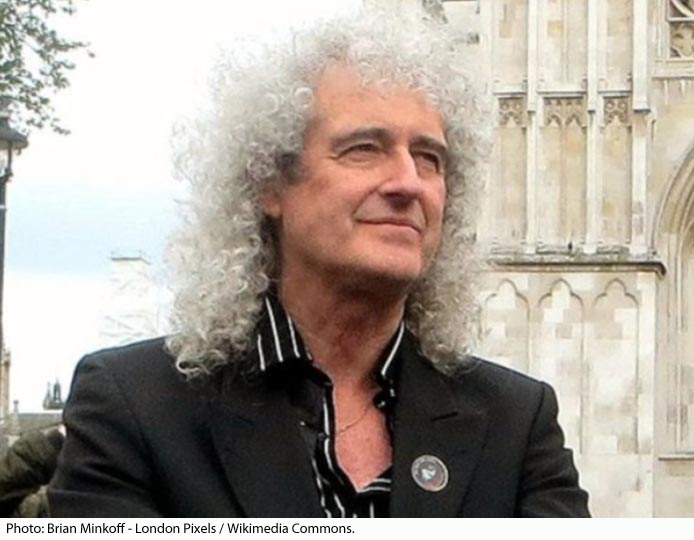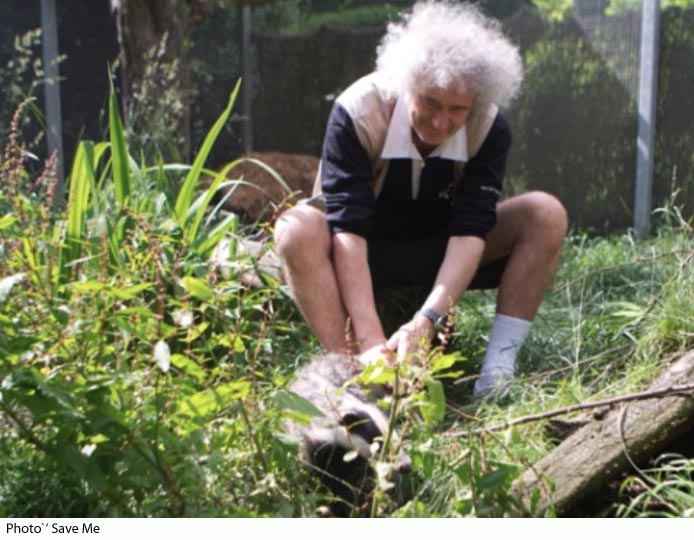Recent interview Brian did for The Ecologist…
THE ECOLOGIST
10 March 2014 by Lesley Docksey
Brian May is best known as lead guitarist for the rock band Queen. But as Lesley Docksey discovers, he is also an astrophysicist, and a committed – and highly effective – advocate for Britain’s wild animals, including badgers put at risk by the UK’s cull programme.
“I always had an interest in animals. As a child at Sunday school I struggled with the idea that only humans had souls. And the Bible said ‘man had been given dominion over animals’. I was later told this was a mistranslation, and should read that man has ‘care’ over animals – but this still didn’t satisfy me.”
Like many of us, Brian was never quite at ease with the thought that ‘animals’ had second place, behind humans. And then something else made him question humanity’s central place in the Universe – astronomy.
“An astronomer only has to look out into the universe to realise we are just a small planet circling a very ordinary star”, says Brian, who took a doctorate in astrophysics. “Ptolemy’s belief that the universe circled the earth was crazy.”

So how did he end up campaigning for our wildlife?
“Well, you know how it is. You spend most your time doing what life has presented to you, in my case Queen. But one day, although I’m still involved in music, I found I had the time, the space and the means to do other things, things that I also cared about.”
What inspired him to found Save Me, a “non-profit organisation that speaks out about the cruel minority in our society that feels it is their right to persecute and torture wildlife for sport”? Was it foxhunting, badgers … ? No, it was …
“Hedgehogs.”
So, from studying the universe he came right back down to earth, to fight for something that, though small, was in his view as important in the scheme of things as a star … or a galaxy.
“I read one day about the hedgehogs on the Scottish Uist islands, and the plans to kill them all because they were eating the eggs of the ground-nesting birds. How could people kill them like that? Didn’t they matter too? I went up to Scotland and got involved with the campaign to save the hedgehogs. And the Scottish RSPCA was one of the organisations in favour of the killing! Can you believe that? We persuaded them to relocate the hedgehogs to the mainland. After all, hedgehogs are in trouble here – there are fewer and fewer of them and we need them. And when we achieved that relocation, the feeling – the realisation that I could help make a difference – that was wonderful! But it also made me see how easy it is for people to see killing inconvenient wildlife as the answer to a problem, when the animals themselves have no voice. And Save Me was born.”
Fighting the badger cull
It was only natural that Save Me would take up the cause of the badgers when the proposed culls threatened another of our ancient and loved members of the British landscape – as did many other organisations devoted to the care of animals and our wildlife. Not that it’s unconcerned about cattle farmers whose herds are afflicted with bTB. As Save Me makes clear on its website: “Save Me fully sympathises with farmers who are effected by this awful disease but it does not believe, based on scientific evidence, the solution lies in the culling of badgers. It believes culling could make matters worse.”
Next Team Badger was formed, “a coalition of national, local and grass roots animal and wildlife welfare organisations representing millions of compassionate citizens” who “reject the government’s policy of badger culling as unsound, unscientific and unacceptable.”
With Brian at its head the plight of the badger – and the unscientific dishonesty of the culls – remained in the news. Through the whole sorry, cruel process of the culls, Team Badger and its members called government ministers to account, questioned their ‘facts’ and kept the public informed.
Cull ineffective, failed humaneness test
It came as no surprise to Brian when details from the Independent Expert Panel’s report were released, saying that the culls had failed both in their humaneness and effectiveness. At the same time the Humane Society International UK released facts from Natural England, showing that the monitoring of the guns had been poor to say the least; that badgers were taking too long to die, and had to be shot more than once.
“Well, we knew it was going to be bad. Yes, we did, and it was no comfort to say ‘I told you so’, when so many creatures had taken too long to die painful, horrible deaths.” But even then he managed to laugh at the silly excuses and justifications put forward by the pro-cull people.
“I was interviewed by the BBC that morning, and found myself arguing with a farmer and a vet – how can a vet excuse what had been done? I talked about the fact that it was likely that the culls would contribute to an increase of BTB because of the perturbation effect – infected badgers fleeing and taking the disease to another area. I was told it was the protesters who had caused the perturbation! And the reason for the poor marksmanship – well, protesters were to blame for that too! How could anyone fire a clean shot when he was being watched by a protester? Not that any protesters were allowed to get that close to the guns.”
The conversation turned to badger baiting, foxhunting – “the Tories will do their best to repeal that law!” – and the dreaded terrier men belonging to the hunts, who send their dogs underground to flush out foxes gone to ground.
“They’re all linked, all part of ‘country pursuits’ – or ‘blood sports’ to name it more honestly. The badgers aren’t safe, which was one reason for creating BACVI.”
Vaccination works
BACVI, for those who don’t already know, is another of Brian’s creations, the Badger And Cattle Vaccination Initiative. Launched in early February in the wake of the disastrous badger culls in Somerset and Gloucestershire, it promoting vaccination – of both badgers and cattle – as the sustainable solution to bTB.
How long was that idea in the making?
“We started thinking about it in 2012 when we went to Brussels. We were constantly being told by Ministers that we couldn’t vaccinate cattle against TB because of restrictions imposed by the EU. They said the EU was prohibiting the necessary field trials. We wanted to find out if this was true. And it wasn’t. They’d love us to vaccinate our cattle! They want us to get on with it!”
There is a vaccine already – BCG – but it has a downside. It interferes with the mandatory tuberculin skin test, so you can’t tell the difference between a vaccinated cow and one that is genuineless infected with BTB. What’s needed is a reliable DIVA test. For the uninitiated, DIVA stands for ‘Differentiating Infected from Vaccinated Animals’, so a DIVA vaccine is one that makes it possible to tell the difference between infected and vaccinated animals.
Lo and Behold! A DIVA test is developed

Last year the AHVLA – that’s Defra’s Animal Health and Veterinary Laboratories Agency – announced they had developed a DIVA test. Field trials of the DIVA vaccine are needed before a full scale cattle vaccination programme can take place – trials that Defra had told us were prohibited by the EU.
As an aside, Brian points out, members of the general public can become vaccinators by going on a 4-day AHVLA course, and then applying for a certificate of competence. Training is also provided by local badger groups on sett survey and other essentials – “so people can get involved without doing the full training course.”
We can only wonder why so much time has been wasted by Defra and its ministers. Had Defra – and its political masters including Owen Paterson – resisted the NFU’s siren calls for badger culling, they could have been pushing forward the real solution to BTB.
Herd immunity
“Vaccination is far less disruptive for badgers, and it’s not as if every badger in a family group has to be vaccinated”, says Brian. “So long as you vaccinate enough a badger group enjoys herd immunity. This is all to do with big landowners too. I know they’re mostly conservatives, but we have some powerful Tories backing us now – just look at the report the Bow Group has done.”
Among the Bow Group’s findings: “Trials have shown vaccination to reduce the incidence of positive serological BTB test results by almost 74%”; and: “A vaccination programme combined with improvements in biosecurity would be the most efficient way to minimise BTB spread and cost to the taxpayer.”
Experience from Wales is proving BACVI right. Commenting on the trial badger vaccination programme carried out at BTB hotspots in Wales, combined with country-wide biosecurity, Wales’ Natural Resources Minister Alun Davies recently told Parliament:
“You will see in Wales that the number of cattle slaughtered in the last year is down 33%; the equivalent statistic for the rest of GB is 14% – less than half. In terms of the number of herds being affected by bovine TB, we have seen reductions of 23%; the equivalent number in England is 6%.”
An entrenched minority that’s not changing its spots
So how does Brian feel about the future? Is he encouraged by the number of people who had become engaged in the anti-cull protests? And that what to engage in positive solutions, like joining badger groups and carrying out badger vaccination?
“Well, yes, but … ”
His voice, so full of enthusiasm for the campaigning and the willingness to laugh at the ridiculous statements of people like Environment Secretary Owen Paterson, became dark, sombre – and sad. There is an entrenched, bloodthirsty minority in Britain that’s not about to change its ways.
“I don’t think we’ll ever persuade them to stop the killing. They like doing it.”
—
Lesley Docksey is a freelance writer who contributes articles to The Ecologist and other news media with international reach on issues of war, peace, politics and the environment.